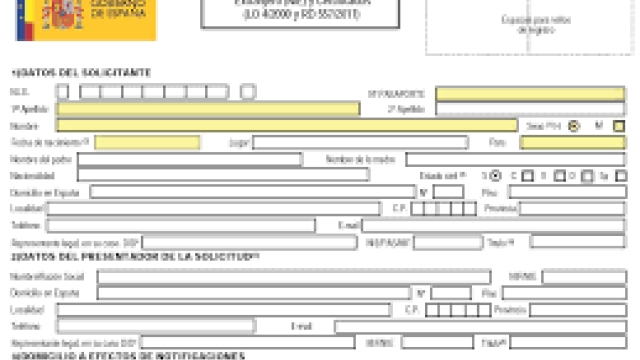Unlocking the Spanish System: The NIE Number Demystified
If you’ve ever considered living or working in Spain, you may have come across the term "NIE number." This seemingly mysterious combination of letters may leave you scratching your head, wondering what exactly it is and why it is so important. Fear not, for we are here to demystify the NIE number in Spain and guide you through the process.
The NIE number, which stands for "Número de Identificación de Extranjero" in Spanish, is essentially an identification number issued to non-Spanish residents. It is a unique identifier that allows individuals to interact with various administrative processes, such as opening a bank account, buying a property, or even obtaining employment. In essence, it is a crucial component of navigating life in Spain as an expatriate.
So, what exactly is the NIE number and why is it necessary? The NIE number serves as your personal identification code in Spain, akin to a social security number in other countries. It not only confirms your legal presence in the country but also enables you to access essential services and engage in important transactions. Whether you’re planning to embark on a new job, start a business, or simply reside in Spain, acquiring an NIE number is a fundamental requirement.
Now that we have established the significance of the NIE number, let us delve into the process of obtaining one. In our comprehensive NIE number in Spain guide, we will walk you through the steps involved, ensuring you navigate the bureaucratic maze with ease. From gathering the necessary documentation to booking an appointment and attending the relevant office, our guide will provide you with valuable insights and practical tips to help you obtain your NIE number efficiently.
Stay tuned as we unlock the secrets of the Spanish system and shed light on the NIE number, providing you with all the essential information you need to know. Whether you’re a prospective expatriate, a current resident, or simply curious about the Spanish bureaucracy, our article will be your go-to resource for demystifying the NIE number in Spain. Get ready to embark on your journey towards navigating the Spanish administrative landscape with confidence!
What is a NIE Number in Spain?
A NIE Number in Spain, also known as the Número de Identificación de Extranjero, is a unique identification number assigned to foreign residents in Spain. It serves as an essential document for individuals who plan to live, work, or carry out significant financial transactions within the country.
The NIE Number is issued by the Spanish government and is required for various purposes, such as opening a bank account, buying or selling property, applying for and obtaining employment, starting a business, or even enrolling in educational institutions. This identification number helps the authorities track and monitor the activities of foreigners legally residing in Spain.
Obtaining a NIE Number in Spain requires completing certain bureaucratic procedures, including filling out an application form, providing relevant documentation, and attending an appointment at the relevant government office or police station. It is important to note that this process can often be time-consuming and may vary depending on the region or province where you are applying.
Once you receive your NIE Number, it is important to keep it safe and easily accessible as you will often be required to provide it as proof of identification. Additionally, it is crucial to ensure that your NIE Number is up to date, especially if any personal information, such as your name or address, changes.
In summary, a NIE Number in Spain is a unique identification number assigned to foreign residents, enabling them to carry out various legal and administrative procedures within the country.
NIE
2. Why do you need a NIE Number in Spain?
Having a NIE Number in Spain is essential for anyone planning to stay or engage in various legal activities within the country.
Firstly, the NIE Number is required for any financial transactions, such as opening a bank account or purchasing property. Without it, you may encounter difficulties in carrying out these important tasks.
Secondly, the NIE Number is also necessary for employment purposes. If you are planning to work in Spain, whether as an employee or self-employed, you will need a NIE Number to be legally employed and to contribute to the Spanish social security system.
Lastly, the NIE Number is often needed when dealing with bureaucratic procedures, such as applying for a driver’s license, obtaining healthcare services, or registering for educational programs. It serves as a unique identification number that helps streamline these processes and ensures that individuals are correctly identified within the Spanish system.
Overall, the NIE Number plays a vital role in navigating the Spanish system, enabling individuals to carry out important activities, work legally, and engage in various bureaucratic procedures.
3. How to obtain a NIE Number in Spain
To obtain a NIE Number in Spain, follow these steps:
Research the requirements: The first step is to gather information about the necessary documents and procedures. Check with the Spanish Consulate or Embassy in your country of residence to find out exactly what you need to apply for a NIE Number in Spain.
Make an appointment: Once you have all the required documents, make an appointment at a Spanish National Police station or Foreigners’ Office (Oficina de Extranjería). Remember to bring your passport, completed application form, and any other supporting documents, as specified by the Consulate or Embassy.
Submit your application: On the appointed day, go to the designated office and submit your application. Be prepared for long queues, especially in larger cities. Once your application is accepted, you will receive a stamped copy as proof.
That’s it! You have now successfully applied for a NIE Number in Spain. Remember to keep your stamped copy safe, as you may need it for various administrative purposes during your stay in Spain.
